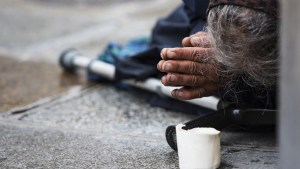Lenten Campaign 2025
This content is free of charge, as are all our articles.
Support us with a donation that is tax-deductible and enable us to continue to reach millions of readers.
“You cannot serve both God and money” (Matt. 6:24).
Perhaps these words of Jesus have never rung as true as they do today, in an age when consumerism has elevated finances to a status of divinity. Those ruled by love of money are major actors in what St. John Paul II called the “structure of sin” enveloping our world. This, of course, has always been a problem. But it can remind us of how all Christians are called to show solidarity with the poor.
A good Lenten resolution
Misery is suffering from the lack of basic necessities, but poverty, when it’s chosen, is a way to live with the minimum without hurting others. “To the hungry belongs the bread that you put in reserve; to the naked man, the cloak you keep in your chests; to the barefoot, the shoe that rots at home; in need, the money you keep buried. So you commit as many injustices as there are people to whom you could give”, wrote St. Basil of Caesarea in the 4th century.
So, poverty is not the lack of money, or even being unable to manage the unimaginable sums of it circulating around the world — it is good that Christians accept being part of the economic system. But we should make choices in such a way that others don’t live in misery while we live with much more than we need.
This is a good thing to reflect on during Lent and into Easter and beyond. Good intentions are not enough; we need to really choose who it is that we worship.
Father Alain Dumont
Read more:
3 Ways to Simplify Your Life

Read more:
One tenth of the world lives in extreme poverty

